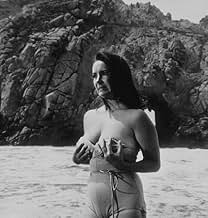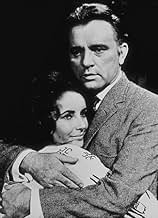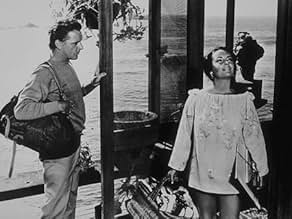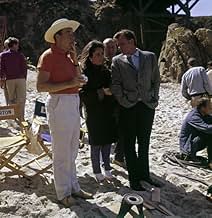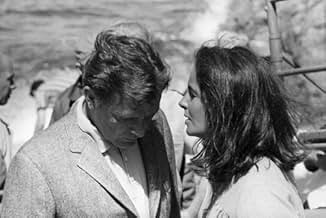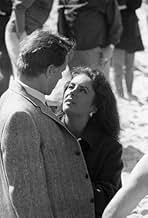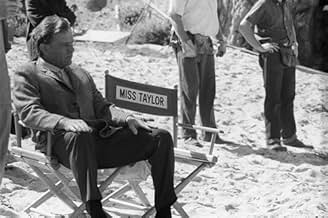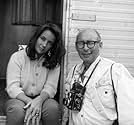Una madre single dallo spirito libero crea un legame con il preside sposato di un collegio episcopale a Monterey, in California.Una madre single dallo spirito libero crea un legame con il preside sposato di un collegio episcopale a Monterey, in California.Una madre single dallo spirito libero crea un legame con il preside sposato di un collegio episcopale a Monterey, in California.
- Regia
- Sceneggiatura
- Star
- Vincitore di 1 Oscar
- 3 vittorie e 3 candidature totali
- Phil Sutcliff
- (as Doug Henderson)
- Trooper
- (non citato nei titoli originali)
- Trustee's Wife
- (non citato nei titoli originali)
- Celebrant #9
- (non citato nei titoli originali)
- Trooper
- (non citato nei titoli originali)
- Celebrant #7
- (non citato nei titoli originali)
- Walter Robinson
- (non citato nei titoli originali)
- Trustee
- (non citato nei titoli originali)
Recensioni in evidenza
"The Sandpiper" begins with a VERY free-spirited mother (Elizabeth Taylor) being hauled into family court because her young son has had another brush with the law. The problems are not serious but the judge is shocked that Taylor is so unrepentant in the way she raises the kid. She's an atheist, is extremely permissive and home schools the boy with her own blend of unusual teaching. Nowadays or even in the late 60s, this sort of child raising wouldn't have gotten much notice (particularly in California)--but here in 1965 it's a bit scandalous--especially since Taylor's character never married nor does she care about legitimizing the boy. Because of this and the child's actions, he is sent to live at a nearby residential school run by the church. Taylor thinks that the Episcopal priest running the place (Richard Burton) is shocked by all this and immediately dislikes him, but he seems rather patient and caring. However, through the course of the film, the two begin to see each other more and more and it's apparent that soon the two will be hitting the sheets together--even though he's married (to a woman, not just God). What's to come of these two? See the film if you'd like.
Apart from the great location shooting, the film is a mixed bag. Some would clearly be offended by its irreverent plot, others bored (as it's VERY talky at times and the dialog becomes awful at about 80 minutes into the film) and others would love it. Those who like really salacious soaps of the era (such as "Peyton Place" and the like) will probably adore the film--as it is filled with fiery content (not just the affair but an attempted rape) and a good looking couple (well, at least Liz). And, in many ways, these same folks often felt like they were peering into the real life relationship between this couple. As for me, I loved the scenery and laughed at the love story. It seemed contrived and you wondered just how any priest could be that stupid. Plus, the dialog between Liz and Dick on the beach was pretty laughable as was the fight at the 106 minute mark and Dick's sermon towards the end. I see the film as a guilty pleasure you see once...and only once. Then, afterwords, to make penance for this, you should watch a really GOOD film!
By the way, despite the name, San Simeon School is supposed to be in nearby Monterey (just north of Big Sur) and has no relation to the Hearst mansion (San Simeon) a couple hours south. Also, I was impressed by a supporting role by James Edwards. For a black actor, it was a great role--a non-black and non-stereotypical role. For its era, it was ahead of its time.
Set in the mid-sixties, when sexual morays were loosening but we were still in the grip of a churchy moralism, this had to be a controversial film, and I vaguely recall that it was. You can visit the locations used in the movie because some are easily recognizable, such as the store/club/restaurant in Big Sur known as "Nepenthe." And of course, there are the famous stone bridges on Highway One spanning two or three of the rugged chasms. Coursing through the movie, especially during the several seascapes, is the theme "The Shadow of Your Smile." It's a nice movie, if not a great one, and worth seeing more than once.
Taylor's character, Laura Reynolds, is an unmarried mother who works as an artist and lives with her nine-year-old son Danny in an isolated California beach house. (The film's title derives from an injured sandpiper which she rescues and nurses back to health thereafter and becomes a symbol of freedom). Danny's behaviour, however, has got him into trouble with the law, and a judge orders her to send the boy to a local boarding school. Laura is reluctant to do this; she is a free spirit who distrusts any form of institutionalised education. To make matters worse from her point of view, the school is run by the Episcopalian Church, and she is an atheist whose attitude to religion is one of positive hostility rather than mere indifference. Nevertheless, she realises that she must comply with the judge's order or risk losing custody of her boy.
Burton plays Dr. Edward Hewitt, an Episcopalian priest and headmaster of the school. Although his values are very different from Laura's, Edward is something of an idealist and is becoming disillusioned with his life at the school, feeling that he is neither a priest nor an educator but merely a fund-raiser. (The school is currently engaged in a major fund-raising drive to build a new chapel, something Edward feels is unnecessary). Edward takes a great interest in Danny's progress and finds himself increasingly drawn towards Laura, possibly because she is so different both from him and from his wife Claire. Claire is attractive and supportive of her husband but rather staid and conventional compared to the bohemian Laura. Eventually Edward and Laura begin an affair, even though he is a married man. (This plot line reminded me of Iris Murdoch's novel "The Sandcastle", published a few years before "The Sandpiper", which also dealt with an adulterous affair between a married older schoolmaster at a boarding school and a young female artist).
Danny himself does not play a major role, being more of a plot device than a character in his own right. I felt that this was a weakness, given that one of the themes of the film is two different philosophies of education. Laura's view is that all formal educational establishments, particularly conservative boarding schools like Dr Hewitt's, are undesirable because they exist in order to turn children into conventional conformists. Her own solution, however, home-schooling Danny in a remote part of the world away from any other children and without a father-figure in his life, struck me as being likely to turn him into a self-centred loner, although the film rather shies away from criticising Laura on this point. The opening scenes in which Danny shoots a deer strike a particularly jarring note. It seemed to me highly improbable that a woman like Laura, whose whole philosophy seems to be one of living in harmony with nature, would allow her young son to have a rifle and then, when he uses it to kill an animal out of wanton curiosity, shrug the whole thing off as a harmless youthful escapade.
Elizabeth Taylor looks stunning, but neither she nor Burton are really at their best here. Burton is certainly not as good as he was as the world-weary spy in "The Spy Who Came in from the Cold", also made in 1965. The relationship between Edward and Laura is not based simply upon sexual attraction, but upon a growing realisation that despite their differences they are kindred spirits. The unbeliever Laura, paradoxically, has more in common with Edward's Christian idealism than does the conventionally pious Claire. The trouble is that one never really senses in Burton's performance the idealistic religious believer hiding behind the mask of the formal and pedantic schoolmaster. Taylor always comes across as slightly too glamorous to be altogether convincing as a proto-hippie.
The film contains some attractive photography of the Californian coastal scenery (although the colours in the indoor scenes are often rather dull) and there is a notable musical score, including the song "The Shadow of Your Smile". As a psychological and emotional drama it has its points of interest, but overall it is a rather dated sixties period-piece, most interesting as a record of that decade's official Golden Couple. 6/10
Lo sapevi?
- QuizRichard Burton tried to get out of making this movie but he was under contractual obligation.
- BlooperClaire Hewitt tells her husband that Danny "was reciting the Prologue to Chaucer's Canterbury Tales in Old English." The language Chaucer wrote in, and that Danny recites in, is Middle English, not Old English.
- Citazioni
Laura Reynolds: [they're on the beach, along the Big Sur] I feel as alone as Robinson Crusoe. Even with the footprints of a man beside me.
Dr. Edward Hewitt: You should always have a man's footprints beside you, Laura.
Laura Reynolds: How do you know I haven't always?
Dr. Edward Hewitt: Because you're afraid of them...
Laura Reynolds: But I'm not as afraid as you think.
Dr. Edward Hewitt: Do you think that one of these days Danny's going to feel somehow that you robbed him of a father?
Laura Reynolds: Well, that's a chance I'm gonna' have to take. Do you know something? If I were a devoted widow, and Danny's father were a dead war hero, would you be pitching me this bit about finding a second father to replace the dead one?
Dr. Edward Hewitt: Touché.
- ConnessioniFeatured in Elizabeth Taylor - An Intimate Portrait (1975)
- Colonne sonoreThe Shadow of Your Smile
Music by Johnny Mandel
Lyrics by Paul Francis Webster
Performed by Jack Sheldon
I più visti
Dettagli
Botteghino
- Budget
- 5.300.000 USD (previsto)
- Tempo di esecuzione1 ora 57 minuti
- Proporzioni
- 2.35 : 1
Contribuisci a questa pagina



